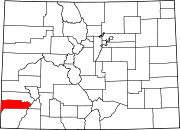Dunton Hot Springs, Colorado
This article has multiple issues. Please help improve it or discuss these issues on the talk page. (Learn how and when to remove these messages)
|
Dunton Hot Springs, also known as Dunton, Colorado (though never officially incorporated), is a tiny huddle of log buildings that sits at 8,600 feet on the West Fork of the Dolores River in the San Juan Mountains in the Southwest corner of Colorado. Dunton is 35 miles (56 km) above Cortez, Colorado, and 25 miles (some very tough and in the winter inaccessible) miles southwest of Telluride.
Dunton was part of a 260-acre (1.1 km2) homestead landed by Joe Roscio in the 1880s. Roscio came west from Minnesota to make his fortune in Colorado mining, and although he never struck it rich, he was successful. At the time Roscio started mining on the West Fork federal troops were kept busy "clearing" the area of resentful Ute Indians who had been hunting the area for centuries. The Smuggler Mine which Roscio started was a tipple style mine operation built on a very steep slope on the shady side of the river. Roscio and his wife had four (or more) children, and the male children went to work in the mine while they were adolescents, a common practice at the time.
The boys were named Joe, Chuck, and Emilio (Mello). Given the feast-or-famine nature of mining, the family survived by trapping and logging and the young men learned at a young age they could make a living off the other miners by building and renting cabins, operating a bar and lodge, and by charging a nickel to use the hot springs. The three brothers (with the help of spouses) changed Dunton's name to Rancho Dolores and it was tremendously popular with families from the Four Corners region for 50 years.
The first hot tub was formed by digging a pit approximately 14 feet (4 m) × 20 feet (6 m), lining it with logs, and diverting the hot water source into it. The mineral content of the water was so high it shortly formed a smooth, copper-colored, mineralized coat evenly over the logs.
Except for a short time in the 1930s, Dunton had no telephone service, and a line that had been run from Rico over the mountain proved impossible to maintain in winter. To the chagrin of the women and the pleasure of the men, the phone line was abandoned. Radio signals were virtually impossible to catch in the narrow valley, and television was never viewed at Dunton until the most recent incarnation of owners took over in the mid 1990s.
The Roscios sold Dunton and its land in 1974 to a group of investors from Telluride and the East Coast. Dunton was a melting pot of local sheepherders, valley ranchers, reservation workers, Telluridians, and hippies making their way from Berkeley to Boulder. Traditional customers gave way to the new style of customer who enjoyed the hot springs and nude volleyball games in the rarefied air.
In the 1990s, a group of German investors rumored to be affiliated with the Henkel family radically transformed Dunton from a bohemian way station with humble amenities to an exclusive resort marketed as "The #7 Luxury Hotel in the U.S." [1] In the 1970s the old cabins (most of which held skunk nests beneath and provided air conditioning via drafts flowing through the unchinked logs)[citation needed] were rented for $5.00 to $25.00 a night. Cabins in the new settlement now rent for over a thousand dollars a night.
References
- ^ "Rocky Mountain High Life". nytimes.com. 2005-01-14. Retrieved 2010-11-22.

